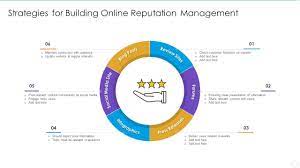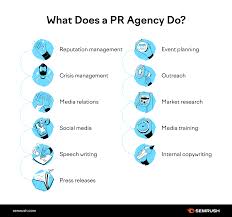Crafting an Effective Reputation Management Strategy for Business Success
Effective Reputation Management Strategy: Building Trust and Credibility
In today’s digital age, a company’s reputation can make or break its success. With the rise of online reviews, social media, and instant communication, managing your reputation has become more important than ever. A strong reputation management strategy is essential for building trust with customers, attracting top talent, and maintaining a positive brand image.
Understanding Reputation Management
Reputation management involves monitoring and influencing how your brand is perceived by the public. It encompasses a range of activities, including:
- Monitoring online reviews and social media mentions
- Responding to customer feedback in a timely and professional manner
- Showcasing positive customer testimonials and success stories
- Proactively addressing any negative press or rumours
- Building a strong online presence through content marketing and SEO
The Benefits of a Strong Reputation Management Strategy
A well-executed reputation management strategy can have numerous benefits for your business:
- Build trust and credibility with customers
- Attract new customers and retain existing ones
- Enhance brand loyalty and advocacy
- Improve search engine rankings and online visibility
- Create a positive company culture that attracts top talent
Tips for Effective Reputation Management
To develop an effective reputation management strategy, consider the following tips:
- Monitor Your Online Presence: Regularly monitor online reviews, social media mentions, and news articles related to your brand.
- Engage with Your Audience: Respond to customer feedback promptly and professionally, showing that you value their opinions.
Showcase Positive Feedback: Highlight positive customer testimonials on your website and social media channels to build credibility. Create Quality Content: Develop engaging content that showcases your expertise and values to attract positive attention. Address Negative Feedback: Address any negative feedback or complaints openly and transparently, demonstrating your commitment to customer satisfaction. In Conclusion
A proactive reputation management strategy is vital for maintaining a positive brand image in today’s competitive business landscape. By monitoring your online presence, engaging with your audience, showcasing positive feedback, creating quality content, and addressing any issues promptly, you can build trust with customers, attract top talent, and enhance your overall success.
9 Advantages of a Reputation Management Strategy: Building Trust, Enhancing Loyalty, and Boosting Brand Visibility
- Build trust with customers
- Attract new customers
- Retain existing customers
- Enhance brand loyalty
- Improve online visibility
- Manage crisis effectively
- Attract top talent
- Increase positive word-of-mouth
- Boost overall brand reputation
Challenges of Reputation Management Strategies: Time, Cost, and Control Concerns
- Reputation management strategies can be time-consuming and require ongoing monitoring.
- Negative feedback or reviews can still impact your brand reputation, despite efforts to manage it.
- It may be challenging to control all online conversations and perceptions about your brand.
- Implementing a reputation management strategy does not guarantee immediate results or instant improvement.
- Reputation management efforts can be costly, especially when hiring external agencies or investing in tools for monitoring.
- Over-reliance on online reputation management may divert attention from other critical aspects of business operations.
Build trust with customers
Building trust with customers is a crucial benefit of an effective reputation management strategy. By consistently monitoring and managing how your brand is perceived, you can demonstrate transparency, reliability, and integrity to your audience. When customers see that you value their feedback, address their concerns promptly, and showcase positive testimonials, they are more likely to trust your brand. Trust is the foundation of strong customer relationships, leading to increased loyalty, positive word-of-mouth referrals, and ultimately, long-term success for your business.
Attract new customers
An effective reputation management strategy can significantly benefit businesses by attracting new customers. When a company maintains a positive online presence, responds promptly to customer feedback, and showcases positive testimonials, it builds trust and credibility with potential customers. A strong reputation not only reassures new clients about the quality of products or services but also differentiates the business from competitors. By actively managing its reputation, a company can create a favourable impression that resonates with prospective customers, ultimately leading to increased brand awareness and customer acquisition.
Retain existing customers
An effective reputation management strategy plays a crucial role in retaining existing customers by ensuring their continued satisfaction and loyalty. By actively monitoring and addressing customer feedback, businesses can identify and resolve any issues promptly, demonstrating their commitment to excellent customer service. By showcasing positive testimonials and success stories, companies can reinforce the trust and confidence of their existing customers, encouraging them to remain loyal to the brand. Retaining existing customers not only fosters long-term relationships but also contributes to a positive brand image and sustainable business growth.
Enhance brand loyalty
An effective reputation management strategy can significantly enhance brand loyalty by fostering trust and credibility among customers. By consistently delivering positive experiences, addressing any issues promptly and transparently, and showcasing the values and integrity of the brand, businesses can build strong emotional connections with their audience. This loyalty not only leads to repeat business but also encourages customers to become brand advocates, spreading positive word-of-mouth and contributing to long-term success.
Improve online visibility
Improving online visibility is a key benefit of a robust reputation management strategy. By actively monitoring and managing how your brand is perceived online, you can enhance your search engine rankings, increase your presence on social media platforms, and ensure that positive information about your business is prominently displayed to potential customers. This increased online visibility not only helps attract more traffic to your website but also cultivates a positive image of your brand in the digital space, ultimately leading to greater trust and credibility among your target audience.
Manage crisis effectively
An important advantage of a robust reputation management strategy is the ability to manage crises effectively. By proactively monitoring your brand’s online presence and having a crisis communication plan in place, you can swiftly address any negative incidents or controversies that may arise. This proactive approach allows you to respond promptly, transparently, and professionally during challenging times, helping to mitigate potential damage to your reputation and maintain trust with your audience. Effective crisis management demonstrates your commitment to accountability and transparency, ultimately strengthening your brand’s resilience in the face of adversity.
Attract top talent
An effective reputation management strategy can significantly benefit a company by attracting top talent to join its workforce. A positive brand image and strong reputation can act as a magnet for skilled professionals seeking employment opportunities. Potential employees are more likely to be attracted to companies with a good reputation, as it signals a positive work environment, ethical practices, and potential for career growth. By showcasing a company’s commitment to maintaining a positive reputation, businesses can position themselves as desirable employers, ultimately attracting talented individuals who can contribute to the company’s success and growth.
Increase positive word-of-mouth
An effective reputation management strategy can significantly boost positive word-of-mouth for a business. By actively monitoring and responding to customer feedback, showcasing success stories, and addressing any negative comments or reviews promptly and professionally, a company can enhance its reputation and encourage satisfied customers to share their positive experiences with others. This increased positive word-of-mouth not only helps attract new customers but also builds trust and credibility in the brand, ultimately leading to long-term success and growth.
Boost overall brand reputation
A key benefit of implementing a robust reputation management strategy is the ability to boost the overall brand reputation. By actively monitoring and shaping how a company is perceived by its target audience, businesses can enhance trust, credibility, and positive perception among customers and stakeholders. A strong brand reputation not only attracts new customers but also fosters loyalty and advocacy, ultimately contributing to long-term success and sustainable growth in the competitive market landscape.
Reputation management strategies can be time-consuming and require ongoing monitoring.
One significant drawback of reputation management strategies is the time and effort they demand, as well as the need for continuous monitoring. Implementing effective reputation management tactics involves regularly tracking online reviews, social media mentions, and other sources of feedback. This ongoing monitoring process can be labour-intensive and may require dedicated resources to ensure timely responses to any issues that arise. Additionally, the dynamic nature of online communication means that reputations can change rapidly, necessitating constant vigilance to maintain a positive brand image. The time-consuming nature of reputation management strategies can be a challenge for businesses looking to balance this aspect with other operational priorities.
Negative feedback or reviews can still impact your brand reputation, despite efforts to manage it.
Despite diligent efforts to manage reputation, negative feedback or reviews can still significantly impact your brand’s reputation. In today’s interconnected world, one negative comment or review has the potential to spread rapidly and influence the perceptions of a wide audience. Even with proactive reputation management strategies in place, it can be challenging to completely control the narrative surrounding your brand. Addressing and mitigating the impact of negative feedback requires swift and transparent responses, as well as a continuous commitment to building trust and credibility with stakeholders.
It may be challenging to control all online conversations and perceptions about your brand.
One significant challenge of reputation management strategy is the difficulty in controlling all online conversations and perceptions surrounding your brand. With the vast reach of social media and online platforms, it can be challenging to monitor and influence every conversation or mention related to your brand. Negative reviews or comments can quickly spread, impacting your reputation before you even have a chance to respond. This lack of control over online conversations highlights the importance of proactive monitoring and swift, strategic responses to mitigate any potential damage to your brand’s image.
Implementing a reputation management strategy does not guarantee immediate results or instant improvement.
Implementing a reputation management strategy does not guarantee immediate results or instant improvement. Building and maintaining a positive reputation takes time and consistent effort. It requires a long-term commitment to monitoring, engaging with stakeholders, and addressing any issues that arise. While a well-executed strategy can lead to significant improvements over time, businesses should be prepared for the fact that building trust and credibility with customers is a gradual process that requires patience and persistence. Rushing the process or expecting instant results can lead to disappointment and undermine the effectiveness of the overall reputation management efforts.
Reputation management efforts can be costly, especially when hiring external agencies or investing in tools for monitoring.
One significant drawback of reputation management strategy is the potential high cost associated with it. Companies may find that investing in external agencies or sophisticated monitoring tools to effectively manage their reputation can be a financial burden. The expenses involved in hiring professional services or purchasing advanced software solutions can add up quickly, especially for small businesses or startups with limited budgets. This cost factor can deter some organisations from implementing a comprehensive reputation management strategy, leaving them vulnerable to reputational risks and challenges in the long run.
Over-reliance on online reputation management may divert attention from other critical aspects of business operations.
An inherent con of over-reliance on online reputation management is the potential diversion of attention from other critical aspects of business operations. While maintaining a positive online reputation is important, focusing excessively on this aspect may lead to neglecting fundamental areas such as product development, customer service, and employee engagement. A disproportionate emphasis on managing online perceptions could result in a lack of investment in core business functions that are essential for long-term sustainability and growth. It is crucial for businesses to strike a balance between reputation management and overall operational excellence to ensure holistic success and resilience in the competitive marketplace.







